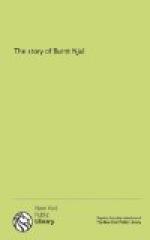But this feeling was also shown in private life. When two tribes or peoples rushed to war, there Odin, the warrior’s god, was sure to be busy in the fight, turning the day this way or that at his will; but he was no less present in private war, where in any quarrel man met man to claim or to defend a right. There, too, he turned the scale and swayed the day, and there too an appeal to arms was regarded as an appeal to heaven. Hence arose another right older than all law, the right of duel—of wager of battle, as the old English law called it. Among the Northmen it underlaid all their early legislation, which, as we shall see, aimed rather at regulating and guiding it, by making it a part and parcel of the law, than at attempting to check at once a custom which had grown up with the whole faith of the people, and which was regarded as a right at once so time-honoured and so holy.
Thirdly, we must never forget that, as it is the Christian’s duty to forgive his foes, and to be patient and long-suffering under the most grievous wrongs so it was the heathen’s bounden duty to avenge all wrongs, and most of all those offered to blood relations, to his kith and kin, to the utmost limit of his power. Hence arose the constant blood-feuds between families, of which we shall hear so much in our story, but which we shall fail fully to understand, unless we keep in view, along with this duty of revenge, the right or property which all heads of houses had in their relations. Out of these twofold rights, of the right of revenge and the right of property, arose that strange medley of forbearance and blood-thirstiness which stamps the age. Revenue was a duty and a right, but property was no less a right; and so it rested with the father of a family either to take revenge, life for life, or to forego his vengeance, and take a compensation in goods or money for the loss he had sustained in his property. Out of this latter view arose those arbitrary tariffs for wounds or loss of life, which were gradually developed more or less completely in all the Teutonic and Scandinavian races, until every injury to life or limb had its proportionate price, according to the rank which the injured person bore in the social scale. These tariffs, settled by the heads of houses, are, in fact, the first elements of the law of nations; but it must be clearly understood that it always rested with the injured family either to follow up the quarrel by private war, or to call on the man who had inflicted the injury to pay a fitting fine. If he refused, the feud might be followed up on the battlefield, in the earliest times, or in later days, either by battle or by law. Of the latter mode of proceeding, we shall have to speak at greater length farther on; for the present, we content ourselves with indicating these different modes of settling a quarrel in what we have called the patriarchal state.




